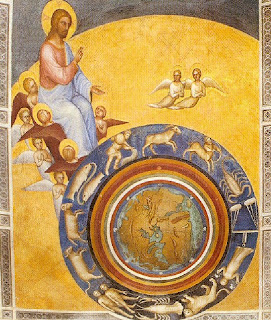The man who invented aliens
Some concepts are so deeply ingrained in modern culture that it's difficult to imagine that someone, at some point in history, must have invented them. Take aliens for example. Aliens, as everyone knows, come from a planet orbiting the star Zeta Reticuli. Or possibly Alpha Draconis. Or Tau Ceti. Or Sirius, or one of the Pleiades. At any rate, they come from another planet, orbiting some star other than the Sun. That's the idea, anyway (aliens being purely hypothetical and/or fictional). But where did the idea come from, and when?

The Bible contains lots of references to the stars, but it doesn't give any indication that they're extremely distant objects of comparable size to the Sun, or that they might be associated with inhabited planets. The Biblical account of creation only really makes sense if the universe is quite a small place, not much larger than the Earth itself. The stars are just tiny points of light fixed to a spherical sky, with heaven on the other side of it (as depicted on the left, in a fresco painted in the 1370s by Giusto de Menabuoi).
Not all cultures have taken quite such a narrow-minded view as this: for example the Egyptian, Babylonian, Indian and Chinese civilizations all seem to have had more realistic views of the size of the universe and the true nature of the stars. But Europe persisted with the "small universe" theory. Nicolaus Copernicus (1473 – 1543) famously demoted the Earth from its place at the centre of the universe... but he put the Sun there instead, which is just as parochial. Copernicus still imagined that the other stars were smaller and less important than the Sun.
The real revolutionary, as far as European cosmology was concerned, was the Italian philosopher Giordano Bruno (1548 – 1600). He believed in an infinite universe, of which the solar system was just an infinitesimally small part. It was Bruno who introduced the idea that the stars are other suns, and that they might have their own planets orbiting around them... and that these planets might be inhabited. In other words, Giordano Bruno was the man who invented aliens.
Bruno's key work in this context was De l'infinito universo et Mondi ("On the Infinite Universe and Worlds"), published in 1584. The whole book is concerned with "the plurality of worlds", but one quote is enough to give an idea of Bruno's view on the subject: "For it is impossible that a rational being, fairly vigilant, can imagine that these innumerable worlds, manifest as like to our own or yet more magnificent, should be destitute of similar and even superior inhabitants."
Nowadays it goes without saying that Earth is the archetypal planet, and the phrase "other planets" refers to planets other than the Earth. But before Bruno, the word "planet" simply referred to one of the five planets visible in the sky: Mercury, Venus, Mars, Jupiter or Saturn... not the Earth at all. As late as 1640 an Englishman named John Wilkins published "A Discourse concerning a New Planet" -- and the new planet in question was the Earth! That sounds ludicrously obvious now, but it's another example of a concept we take for granted today, which was far from obvious in the past.
In the end, Giordano Bruno was tried by the Inquisition for heresy -- and, since he refused to recant, he was burnt at the stake on 17th February 1600. It's cool to think (as many people do) that he was put to death because of his belief in the plurality of worlds -- the first ever martyr to science fiction, as it were. However, this is far from proven. Bruno was a prolific writer throughout his life, and almost everything he wrote was designed to annoy the Church in one way or another. According to A New and General Biographical Dictionary (1798): "Though he denied the being of a God, he believed the effects of magic and sorcery".
forteana-blog.blogspot.com |





